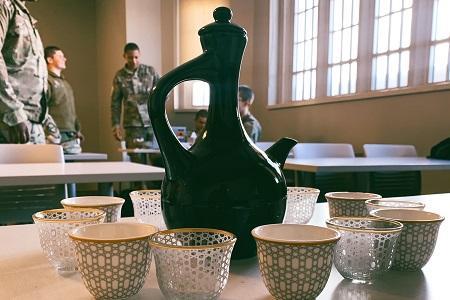VMI Cadets Enjoy Jebena Coffee: A Rich Blend of Culture, Research, and Classroom Engagement

Cadets in Maj. Jason Schroepfer’s Arabic course prepare to enjoy a ‘fanajin’ of jebena, a coffee drink traditionally enjoyed in Arabic speaking communities of northeast Africa and the Arabian peninsula.-Photo courtesy of Maj. Jason Schroepfer.
LEXINGTON, Va., Dec. 14, 2022—Coffee, conversation, and hospitality go hand-in-hand. The first coffeehouses were places to meet, discuss ideas, political aspirations, and business dealings. Modern coffee shops are a favorite place for friends to gather for conversation and relaxation. This social convention is not limited to the western world, however, and is a large part of the social life in Arabic-speaking communities.
Maj. Jason Schroepfer is an assistant professor in the Department of Modern Languages and Cultures and director of the National Security Agency funded Arabic STARTALK program at Virginia Military Institute. Between 2012 and 2015, he took several trips to Aswan, Egypt to research the native dialect and conduct extensive field work in order to write his dissertation on the dialect. He published an article on the topic that recently appeared in a leading journal in the field of Arabic dialectology called Die Wiener Zeitschrift für die Kunde des Morgenlandes.
Schroepfer credits much of his success in his linguistic field work, that of reviewing and analyzing his field notes and interview recordings, as well as consulting native speakers, to jebena, a coffee drink traditionally enjoyed in Ethiopia, Sudan, and Aswan, particularly among the youth. It may be roasted outdoors over an open fire and freshly ground by hand, or similarly prepared indoors with appropriate cookware. It offers a way for hosts to demonstrate Arab hospitality as well as a social venue for oral narratives on topics ranging from the daily grind of life to lively debates on contemporary politics. “It was truly an honor to experience the warm hospitality and learn from southern Egyptian community members over a cup of jebena,’’ said Schroepfer.
An Arabic course at VMI Schroepfer teaches is called “As-Sard” and revolves around narratives and perspectives on social issues in Arabic speaking communities of northeast Africa and the Arabian peninsula. Cadets in the class read articles about jebena as well as the history and culture of southern Egypt and Sudan in both English and Arabic. “This helped build cadets up step by step to accomplish the lesson objective which is, ‘I can teach an aspect of jebena culture in Arabic to another cadet.’ Some cadets were assigned to brainstorm in Arabic about some cultural aspects of jebena based on their readings. For example, it is recommended that guests leave as little jebena in the cup as possible and perhaps drink around three ‘fanajin,’ a small espresso-sized cup, to highlight the host’s hospitality. Guests shake the coffee cup to indicate they want more coffee, not shaking it means they have had enough. Some cadets in the class were assigned to describe the process of making traditional jebena based on their readings. All the students then exchanged their ideas in Arabic during a class ‘coffee party,’ while learning and enjoying this beloved drink together,” explained Schroepfer.
Jonathan Ballesteros-Novoa ’24, a modern languages and culture major from Fredericksburg, Virginia, and a student in the class said, “Learning like this is engaging. We are learning a significant part of a culture as well as a language.”
Katelynn Riley ’23, a modern languages and culture major from Stafford, Virginia stated, “Jebena coffee provides both major and small scale ways to experience part of Arab culture.”
Schroepfer wants future leaders to deeply engage with other languages and cultures, so he visited a few 4th Class level History classes to share this piece of Arabic culture with students who had recently been studying Nubia, and the spread of Islam. Following Schroepfer’s presentation, one History student said, “I really appreciated the guest speaker and thought the jebena presentation was great. Being able to learn more about Arab culture and having the first-hand experience to drink the coffee helps bring the lesson home and make it real.”
Marianne Hause
Communications & Marketing
VIRGINIA MILITARY INSTITUTE
.svg)
.png)